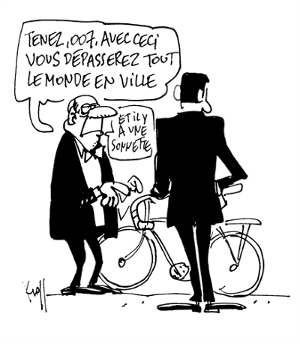
Cycling as an alternative to the automobile
Half of car mobility is less than 3 km in our cities. By transferring this half into bike mobility, we would make our cities and our planet more enjoyable to live in.
Do we still need to repeat the aberrations that represent the misuse of the car in town?
- At the local level, city people experience noise and air pollution, loss of social ties in neighborhoods, time loss in traffic and loss of their positive mood…
- Globally, car system contributes to climate change, the plundering of oil resources and related armed conflicts, the unconditional support of dictatorships, in financial globalization and the ideology of the "seeming and having".
Bike co-op to promote cycling
Many people are motivated by the desire to save time, have a physical activity, save money, respect the environment its citizens, want to try cycling. However, this transition is not always easy! This process arise many question that are as many obstacles to it.
- Where do I buy a bike? Which bike do I buy? What to do for not getting it stolen? Where do I park?
- Where can I learn to ride a bike? How to get around the city safely?
- How do I fix and maintain it?
Bike Workshops attempt to answer these questions and remove some of these barriers allowing bike repair learning at a low cost, to buy a second hand bike, by promoting exchanges between cyclists and organizing festive events around the bike.
L’Heureux Cyclage to develop bike co-ops
The bike co-op network was structured to encourage the development of bike co-ops all over France and beyond. On one hand, it serves as an exchange platform between co-ops and project leaders. On the other hand, it serves as a national voice to raise awareness about bike co-ops and issues they face to government and other stakeholders.
The networks and want to express the co-op’s needs:
- to have facilities to organize the co-op activity.
- to recover the bicycle in recycling centers.
- to have grants to support co-op’s activities.
Finally, it should facilitate contact with international bike co-op.
